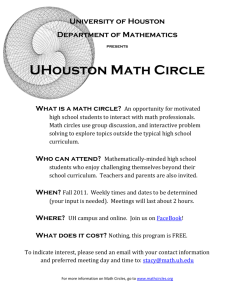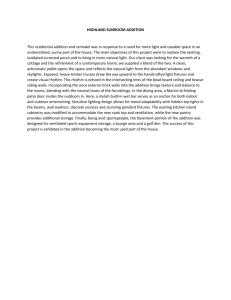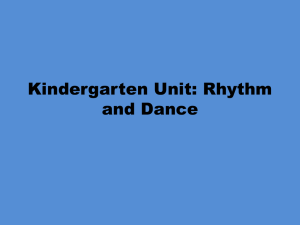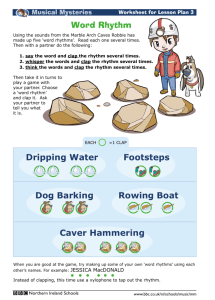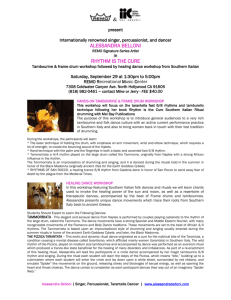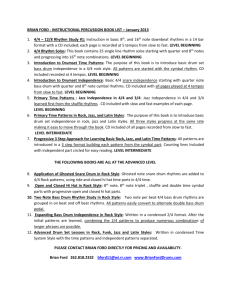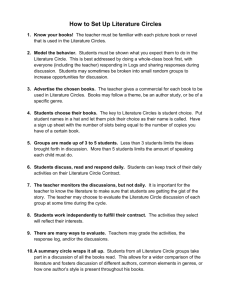Piñon Management Wellness Program Drum and Sound Circle
advertisement
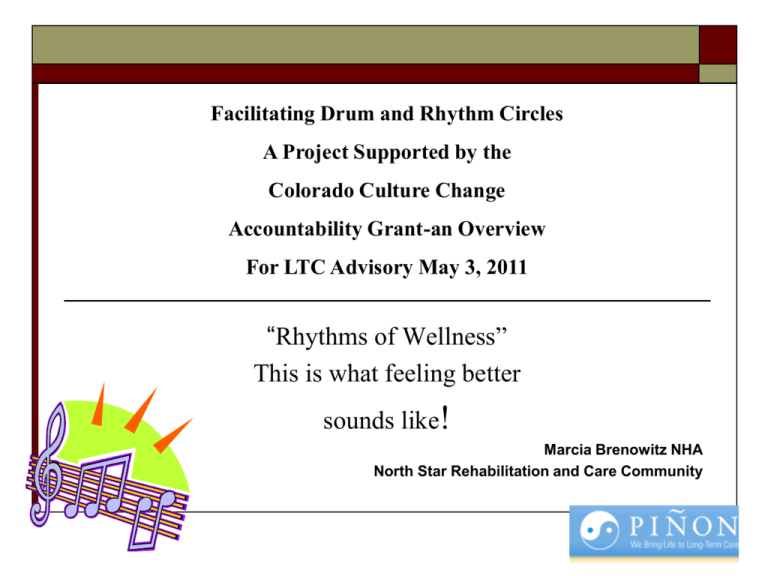
Facilitating Drum and Rhythm Circles A Project Supported by the Colorado Culture Change Accountability Grant-an Overview For LTC Advisory May 3, 2011 “Rhythms of Wellness” This is what feeling better sounds like! Marcia Brenowitz NHA North Star Rehabilitation and Care Community What we will cover during our time together: An overview of the CCC Accountability Grant request The benefits of drum and rhythm circles Who can participate in circles Equipment for a drum and rhythm circle Tips for conducting a rhythm circle Question…..? How many people are already facilitating or have staff facilitating drum and rhythm circles in their homes? The 2010 CCC Accountability Grant Provides and opportunity for homes to start or enhance a drum and rhythm circle in their home through the loan of equipment, books, and an invitation to share a circle at North Star Rehabilitation and Care Community. CCCC Accountability Grant : Based on a grant I was able to receive through the Colorado Culture Change Accountability Board, I was able to be trained as a Remo HealthRHYTHMS facilitator and purchase drum and rhythm circle equipment. Following this I had the opportunity to present on facilitating circles to activity staff and students . In January of 2011, activity staff who attended the CAPA conference were able to sign up to try out instruments for a month at a time. They will be collecting some simple data during the month. The benefits of the program is being measured in 3 areas Stress reduction Pain reduction And sense of connectedness with self and others Why I asked for the grant to incorporate drumming and rhythms into therapeutic programming: Building Community –the primary goal! Drumming and participation in group rhythm sharing is a fun, natural and effective tool in building and supporting a sense of community. From the earliest times in man’s history, people have gathered together among clans and tribes to make sounds and use rhythms to celebrate, build unity and enjoy leisure time. And…. • • • • • There is an ever increasing amount of research which points to the many physical and psychological benefits of drumming and participating in rhythm activity. Some of these include: a sense of belonging a reduction in stress an opportunity to experience self expression and creativity range of motion exercise in a fun mode relaxation Documented Medical Benefits of Drumming Stress Blood samples from participants of an hour-long drumming session revealed a reversal of the hormonal stress response and an increase in natural killer cell activity (Bittman, Berk, Felten, Westengard, Simonton, Pappas, Ninehouser, 2001, Alternative Therapies, vol. 7, no. 1). Depression Stanford University School of Medicine conducted a study with 30 depressed people over 80 years of age and found that participants in a weekly music therapy group were less anxious, less distressed and had higher self-esteem (Friedman, Healing Power of the Drum, 1994). Cont…. Cancer Subjects who participated in a clinical trial using the HealthRHYTHMS protocol showed an increase in natural killer cell activity and an enhanced immune system. While this does not indicate a cure for cancer, such results may be of benefit for those facing this disease. (Bittman, Berk, Felten, Westengard, Simonton, Pappas, Ninehouser, 2001, Alternative Therapies, vol. 7, no. 1). Alzheimer’s Disease According to Clair, Bernstein and Johnson (1995), Alzheimer’s patients who drum can connect better with loved ones. The predictability of rhythm may provide the framework for repetitive responses that make few cognitive demands on people with dementia. Cont…. Parkinson’s Diseases and Stroke Rhythmic cues can help retrain the brain after a stroke or other neurological impairment, according to Michael Thaurt, director of Colorado State University’s Center of Biomedical Research in Music. Researchers have also discovered that hearing slow, steady rhythms, such as drumbeats, helps Parkinson patients move more steadily (Friedman, Healing Power of the Drum, 1994). Chronic Pain Chronic pain has a devastating propensity for progressively draining quality of life. Technology and pharmacology are falling short of the mark needed to improve quality of life and reduce pain, according to Dr. Barry Bittman in the Pain Practitioner. (Lingerman, H. 1995, Music and You. In the Healing Energies of Music. Wheaton, Ill.: Theosophical Publishing House). Percussion's Contribution to the Wellness Movement The drum plays a unique and key role in enabling people to experience the health benefits of recreational music-making. There is a reason why drumming has been an ancient tool of community health in cultures from Africa, Egypt, Brazil, and Cuba. In the Native American culture of the United States, the drum plays a significant role in spiritual practice, ceremony, and ritual. In modern-day language, these key aspects of group drumming that serve both personal and community health and wellness are as follows: • Drumming is accessible - The drum is a userfriendly instrument that everyone can play. • Drumming is immediate - It offers a unique learning curve with fast results. • Drumming is inclusive - It creates a common ground for novices and experts, young and old, disabled and able-bodied. • Drumming allows self-expression - It is a medium of non-verbal creativity. • Drumming allows communication - across cultures, ages, and disabilities. • Drumming releases stress - Its unique aesthetic enjoyment creates a palette for physical and emotional release. • Drumming is a social elixir - It brings people together for an amazing experience in inspiration and connection. "Music health workshops" exist in every session of the Empower Asthma Management Program for those children who get to express their own rhythms while learning about their disease. They exist in the music therapy sessions where Alzheimer's patients play paddle drums and experience a quality of life that is difficult to reach from their state of illness. And they exist in the programs of rhythmical health facilitators who understand how drum circles contribute to the lives of many thirsty people looking to enhance their mind, body, and spirit through music. Should Drums be Sold in Pharmacies? Christine Stevens. 2001. Percussive Notes. The feedback from North Star’s residents supports this! On January 3rd, 2011, the participants of the North Star morning drum and rhythm circles were asked to provide subjective feedback on their drum circle experience to share at the upcoming CAPA Activity conference: Participants included males and females. They ranged in age from 24 to 83. Medical and cognitive challenges faced by participants included: multiple sclerosis, stroke, traumatic brain injury, chronic mental illness, developmental disability and dementia. “Because drumming heals." It heals with energy”Geoffrey I. “Rhythm circles are a way to promote interaction with each other”-Loni J “It is fun-tell them all it is fun” Janet C “Tell them it is AWEsome fun” –Karen M “It gets everyone involved” Joe B “We learn to appreciate different music” Bea R “ It is a fun way to play” Estella S How benefits of the program is being measured: The impact on stress reduction and sense of connectedness is subjective and based on self reporting by resident community members and observations of care partners. Pain reduction is evaluated through examination of routine and prn pain medications usage prior to incorporation of the drum and rhythm circles and after it is a part of the home’s therapeutic programming. Sense of connectedness is based on self reporting and care partner observations around changes in interactions initiated in public areas with others and participation at social events. Facilities are using a Summary Form: CCCC Accountability Grant 2010 Drum and Rhythm Circle Facility Assessment Summary Form Facility:_____________________________________________________________ Address:__________________________________________________________ Designated Facilitator:_______________________________________________ Contact telephone # :____________________ e mail:_____________________ Period of assessment:________________________________________________ Overview: The impact on stress reduction and sense of connectedness will be subjective and based on self reporting by resident community members and observations of care partners. Pain reduction will be evaluated through examination of routine and prn pain medications usage prior to incorporation of the drum and rhythm circles and after it is a part of the home’s therapeutic programming. Sense of connectedness will be based on self reporting and care partner observations around changes in interactions initiated in public areas with others and participation at social events. OPTIONAL – (but very interesting!) Lowered blood pressure is a frequently cited benefit of drum and rhythm circles. Homes are invited to measure blood pressure prior to and following drum and rhythm circle participation and track this data. Submit summary page along with individual assessment forms to: And individual participant pages: CCCC Accountability Grant 2010 Drum and Rhythm Circle Facility Individual Participant Assessment Form Facility:___________________________________________________________ Address:__________________________________________________________ Designated Facilitator:_______________________________________________ Contact telephone # :____________________ e mail:_____________________ Period of assessment:________________________________________________ Participant: (first name, last initial______________________________________ Participant’s age:______________________ The impact on stress reduction and sense of connectedness will be subjective and based on self reporting by resident community members and observations of care partners. ( Check one) No change was observed Changes in stress and/or connectedness were reported and observed. These included ________________________________________________________________________________ ________________________________________________________________________________ ________________________________________________________________________________ Pain reduction will be evaluated through examination of routine and prn pain medications usage prior to incorporation of the drum and rhythm circles and after it is a part of the home’s therapeutic programming. No change in pain medication use occurred Changes in pain medication use included ________________________________________________________________________________ ________________________________________________________________________________ ________________________________________________________________________________ Page 2 Sense of connectedness will be based on self reporting and care partner observations around changes in interactions initiated in public areas with others and participation at social events. No change in connectedness /response to others/enhanced socialization occurred Changes in connectedness /response to others/enhanced socialization included: _____________________________________________________________________________________ _____________________________________________________________________________________ _____________________________________________________________________________________ _____________________________________________________________________ OPTIONAL – (but very interesting!) Lowered blood pressure is a frequently cited benefit of drum and rhythm circles. No change in Blood pressure was identified. Blood pressure changes identified were Date_________ Starting BP__________ Post circle BP______ Date_________ Starting BP__________ Post circle BP______ Date_________ Starting BP__________ Post circle BP______ Date_________ Starting BP__________ Post circle BP______ Date_________ Starting BP__________ Post circle BP______ Date_________ Starting BP__________ Post circle BP______ Attach completed individual participant forms to the Facility Summary overview and mail or fax Or e mail to : Marcia Brenowitz NHA North Star Community 3185 W Arkansas Ave Denver, CO 80219 Fax 303 922 3494 mbrenowitz@pinonmgt.com Cont. OPTIONAL – ( but very interesting!) Lowered blood pressure is a frequently cited benefit of drum and rhythm circles. I did not including this in the grant project - as, while based on outcomes at North Star, blood pressure did decrease 10 to 18 points after the shared hour of rhythms, the clinical atmosphere the blood pressure equipment and measurement presented detracted from the experience for a number of resident community members. A coordinator in each home participating in implementing the Rhythm circles is identified to gather the information and forward it to me. Homes that have or will be using the grant equipment are: Brookshire House-Denver Berkley Manor Care Center –Denver Serenity House Assisted Living –Denver Loveland Good Samaritan –Loveland Mountain View Care Center –Colorado Springs Fitzsimmons Colorado State Veterans Home-Aurora To Date: Training on facilitating a drum and rhythm circle has been done with: 4 Staff and 9 boys from Mt St. Vincent Home Activity staff who attended the annual Activity Professionals conference in January Members of Pinon Management’s Wellness Project Students in the current activity professionals course at Arapahoe Community College Attendees at the Colorado Culture Change Coalition Meeting in March 2011 Overview of facilitating a drum and Rhythm Circle - it is an activity for everyone! There is a role in a Rhythm Circle for every resident community member and staff member in your home! ****and this is where our LTC staff shine -they are leaders in inclusion and accommodation! Some people will be physically capable of reaching out to bang a table drum or a djembe type drum on the floor. Others will be able to tap along using a smaller hoop type drum which they hold in their lap. Some people will be able to follow the rhythm pattern and others will add a creative flair with their individual spontaneous playing. There are a number of rhythm instruments which can be enjoyed by people who cannot drum related to contractures, spasticity, hemi paralysis which limits their mobility. Rain sticks can be held with one hand, and the smaller ones are not too heavy for most people to turn over and play. Hand bells can be purchased in groups and distributed individually are small, lightweight and generally easy to slide into the hands of people with even moderate contracture. Tambourines can be held with one or two hands and make sound with fairly limited movement on the part of the player. Chimes can provide a wonderful tool for ending the session with a meditation. Those who do not wish to hold an instrument can contribute by clapping in time to the rhythms, and of course there is always room for people to join in as “audience.” Often people who are hesitant to try something new will be willing to accept an instrument after filling in for several weeks first as an “audience” participant. The drum and rhythm circle can also provide a fun way for partners in caring to spend time with resident community members they are providing services for. Hospice staff, physical and occupational therapy staff, restorative program assistants and mental health clinicians can accompany resident community members to the drum and rhythm circle and join in either as a therapeutic exercise or just for a fun shared experience. Family members can add to the activity too-either as participants or enthusiastic audience. The basics for a drum and rhythm group includes: a room or area to play which is easily accessible and has seating an activity calendar which identifies the group with date and time opportunities to let your residents and staff know about the group and get them interested in participating such as morning community meeting or Resident Council and Family Council. instruments a place to store instruments when not in use a CD player and several music CDs to play along with staff to help people get to and from the group a record of participation form- OUR HOMES HAVE MOST OF THESE ITEMS ALREADY Starting a drum and rhythm circle does not have to be expensive: Hoop drums –these can be purchased in music stores as well as online. For residents who have limited strength, children’s hoop drums are small, lightweight and have the benefit of being less expensive. You can also go to websites and view the drum making instructions. Rain sticks – these can be purchased for between $12.00 and $30.00 depending upon the size and decoration. An inexpensive alternative is to make your own. Instructions can be found online at a variety of sites. Tambourines –these can be found in music stores, online and also in toy stores. Maracas-are lightweight, fun and easy to play. You may be able to find some in South American crafts stores. You can also make your own using a balloon and paper mache. Instructions can be found at Instructions for making tube drums can be found online.. There are many other percussion instruments which can be purchased or made in activity crafts group. Instructions are available online. Everyone can participate! AND: Anyone can facilitate! You just share the information that a rhythm circle is a “conversation” using the language of sound! Some fun exercises ( Cooperation) Playing along to a CD Or: Starting with one participant and having the next person join in until one by one –everyone is playing the rhythm together Asking participants to play to the rhythm of your feet. Stand in the center and alternate walking, hopping, slowly and quickly A round ( Teamwork skills) Divide into 2 sides of the group. Have 1 side play one rhythm and the other play a different rhythm. Play rounds of "3 Blind Mice" and Row Row Row Your Boat The rhythm of a story ( a chance to be creative) Have resident choose a word and write it on a dry erase board or large piece of paper. Weave a story from the words, when you use someone’s wordpoint to them and have them play their instrument. Rhythms with intention( thinking of the larger community) Ask participants one at a time to name: someone or something they wish to play for. Have them start the rhythms and then have the rest of the group join in. Rhythms for an audience (self esteem) Play to practice. Participants can enjoy the opportunity to perform for a family night or another home’s residents. It can be great fun gathering to practice for an opportunity to share rhythms with others. Concluding the circle You can end the group by asking everyone involved to participate in heartbeat drumming. This is drumming together to the natural heartbeat we all experience even before we were born, Alternatively, the people with soft melodious instruments such as chimes may be asked to play softly while participants close their eyes and breathe quietly to their own imagery or an image provided by the group facilitator. Wellness exercise: consider gentle stretching: Once all the instruments have been gathered you may wish to lead participants in some simple stretching exercises including: Reaching arms forward an stretching fingers out Rotating wrists in circles in both directions Shaking hands and fingers out Taking several deep cleansing breathes. Inspire alertness with a deep belly laugh! ( and raise those endorphins!) If your participants have been lulled to a dozing state by the heartbeat drumming or soft chimes, you may find it helpful to bring them to a state of alertness by sharing a “good bye belly laugh”! Approach each participant in the circle and tell them you will share a healthy deep belly laugh. Ask the participant to copy you. Take a deep breath and give out a Ho Ho Ho. Smile or laugh to acknowledge your participants response back to you. Maintain eye contact and now laugh a nice deep Ha Ha Ha. Acknowledge participants response back with a grin or smile. Move around the circle until you have shared the laughter exercise with all the participants. You may wish to shake the hands of willing participants as you laugh back and forth. Brookshire’s experience. Debbie Ahrens, Activity Director was first to use the grant shared instruments: She reports residents who had not participated in other activities came alive in rhythm circle She shared her concern about passing the equipment on at the end of the month’s use. When this was shared with the residents of North Starthey agreed to send the drums and maracas and tambourines we had used before the grant purchase to the people who live at Brookshire-they knew keeping the beat going is important! Can I answer any questions ? Thank you for your attention. And thank you to the Culture Change Accountability Board for allowing us to enjoy and share all the benefits of this grant project.
